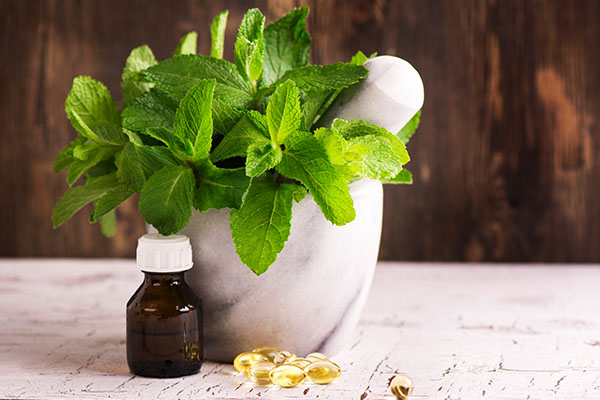In this article:
Strep throat is a bacterial infection caused by Streptococcus (strep bacteria) and is characterized by a sore throat, headache, fever, bad breath, and nausea.

This infection has a sudden onset and spreads easily from person to person, which, therefore, warrants proper precaution and personal hygiene on the part of both the infected individuals and those who come in contact with them.
Although strep throat can generally be managed through antibiotics and self-care measures, severe cases can induce serious complications if left untreated.
Home Remedies for Strep Throat
Various ingredients commonly available in your kitchen can help relieve the symptoms associated with a sore throat.
1. Rinse your throat with apple cider vinegar
Unfiltered apple cider vinegar (ACV) is replete with good bacteria or “the mother,” which can help eliminate the infection-causing strep bacteria in your throat. The use of ACV as a diluted solution to gargle is believed to be effective due to its antibacterial properties. (1)
How to use:
- Mix 1 tablespoon of ACV and honey in a glass of warm water, and use this solution to gargle.
- Rinse your mouth with plain water thereafter to wash the ACV off your teeth. Prolonged exposure to this acidic liquid can erode or weaken your teeth enamel.
Note: It is best to consult your doctor before trying this ACV solution for gargling due to its acidic nature.
2. Have honey

Raw honey possesses antioxidant and immune-boosting properties that have been used for sore throats for long. A study showed that honey is an effective wound healer, which means it may help speed healing for sore throats. (2)
How to use:
Add 2 tablespoons of honey in a glass of warm water or tea and consume it thrice a day.
3. Consume cayenne pepper
Cayenne peppers contain vitamin C and act as analgesics, (3) which help soothe your throat. Additionally, it can relieve a stuffy nose by loosening the mucus.
How to use:
- Mix 1 teaspoon of cayenne with 1 tablespoon of honey in a glass of warm water, consume this mixture.
- Use cayenne pepper as a spice in your salads or foods.
4. Use garlic
Garlic is also an anti-inflammatory and antibacterial agent. It contains highly concentrated amounts of sulfur that relieve the inflammation and infection in the throat. (4)
How to use:
- To one cup of boiling water, add ½ teaspoon cinnamon, 1 teaspoon grated garlic, and a pinch of cayenne pepper.
- Simmer for 2 minutes and strain the liquid.
- Consume twice daily.
5. Consume peppermint oil

Peppermint oil exhibits antibacterial properties. (5) It also aids in reducing inflammation and its menthol content gives a cooling sensation.
How to use:
- Add a couple of drops of peppermint oil in one glass water and consume.
- Apply peppermint oil to your chest, temples, and throat.
6. Eat Tulsi
Tulsi, or basil leaves, helps in calming a sore throat. In one study, tulsi extract demonstrated an antimicrobial property against Streptococcus mutans. (6)
How to use:
- Chop five basil leaves and add them to a cup of boiling water.
- Steep for 5 minutes.
- Strain the liquid, chew the leaves, and consume the tea.
- Repeat this remedy for up to 5 times a day.
7. Gargle with salt water
Gargling with a warm saline solution is one of the most tried-and-tested remedies for relieving a sore throat, including the one caused by a strep infection.
This liquid works as a disinfectant that kills and flushes out the germs in your throat. The salt also helps bring down the inflammation, which is responsible for the pain and scratchiness in your throat.
How to use:
- Put ¼ teaspoon of table salt in 8 ounces of warm water, and stir it until the salt dissolves.
- Use this solution for gargling but do not swallow it.
- Do this twice a day.
Self-Care for Strep Throat Relief

The symptoms of strep throat can often be managed with the following measures:
- Drink generous amounts of nutritive fluids such as clear soup. Drinking cold liquids can temporarily numb or desensitize the nerve endings in the throat, which can ease the pain and soreness associated with this condition.
- Do not consume solid food if swallowing causes pain. Instead, follow a soft diet that includes easy-to-gulp foods, such as frozen yogurt, mashed potatoes, and applesauce. When the pain subsides, eat healthy foods to regain your strength and boost your immune system.
- Gargle with a warm saline solution to help kill the bacteria and comfort your irritated throat.
- Suck on hard, sugar-free candy or lozenges.
- Voice rest is important. Avoid yelling and excessive talking as these may strain your voice box. Whispering is considered to be even more stressful for the throat and voice.
- Use a room humidifier to maintain moisture in your surroundings.
- Apply a warm compress to your neck.
Most-Asked Questions About Strep Throat
Is strep throat contagious?
Strep bacteria are easily spreadable via airborne droplets or through contact with an infected person or contaminated surfaces. Without the use of antibiotics, the infection stays contagious for 2–3 weeks. (7) Patients usually become non-contagious after 24 hours of starting antibiotics.
How can one prevent the infection from spreading?

To avoid spreading your infection and exposing others to strep bacteria, follow these tips:
- Maintain distance from other healthy individuals in the early days of the infection up until you have been on an antibiotic course for at least 2 days.
- Cover your mouth with a tissue or your arm when you cough; quickly dispose of the tissues in the appropriate receptacle thereafter.
- Maintaining hand sanitation is important. Always wash your hands before touching cutleries or food, especially after coughing.
- Do not share any kind of toiletries with others. Utilize single-use paper cups and towels to minimize the chance of spreading the infection.
- Avoid sharing your utensils and food.
- Do not drink alcohol or smoke.
- Avoid cooking for other people.
- Avoid going to public places such as school or work to prevent spreading this highly contagious infection.
Are sore throat, tonsillitis, and strep throat the same?
A sore throat may be a symptom of an inflammation or infection in the upper airway. Infectious causes of sore throat are usually viruses such as the common cold virus.
On the other hand, strep throat is a bacterial infection caused by group A Streptococcus. Tonsillitis is a condition where your tonsils become inflamed or infected and then swell up.
Can strep throat cause a skin rash?
In only a few cases, a skin rash may develop during a strep infection. A strep throat with a skin rash on the body is known as scarlet fever and is very rare. The simultaneous occurrence of a skin rash and a sore throat can be a sign of several other common medical conditions as well.
Can strep throat infect the face?
If the infection is severe and causes complications such as rheumatic fever or scarlet fever, strep throat may affect the skin or soft tissues of the face rarely. However, it remains limited to the throat in the majority of the cases.
Can one get strep throat from pets?
Contracting a strep throat from your pets is a very rare occurrence but is known to happen. This may be caused by viruses or bacteria, types that often do not cause infections in humans.
Why do some children experience recurring strep throat?
A weak immune system makes a child susceptible to infections. Some children may have improper antibody production due to abnormally small immune structures in their tonsils, which are unable to fight the infection.
This puts them at a greater risk of strep throat than those who have normal-sized immune structures. Repeated infections further make the children prone to the disease.
How long does it take to recover from strep throat?
With treatment, the pain associated with strep throat may last for 1–3 days. (8) Once the antibiotic course is started, children can return to school after 24 hours, provided that they do not have a fever or lethargy.
Final Word
A poorly handled case of strep throat can invite a range of other relatively serious complications, as the unchecked growth of bacteria spreads to other parts of the body, such as the heart valves, joints, kidneys, spine, and even brain.
Thus, one must not take strep throat lightly and complete the full course of antibiotic treatment to prevent relapses and complications. This is not to say that you must overdo your antibiotic use, which will only make the bacteria resistant to the drug, triggering undue side effects.
The idea is to adhere to the doctor-prescribed dosage and exercise proper self-care to mitigate the symptoms and make a quick recovery.

- Was this article helpful?
- YES, THANKS!NOT REALLY


